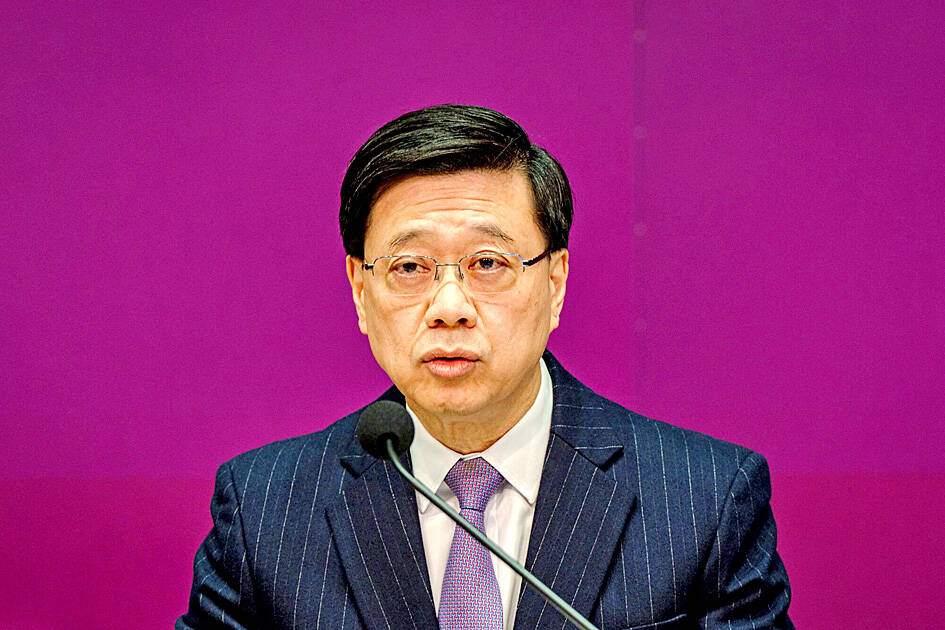Hong Kong’s leader yesterday announced that the territory would urgently create a new security law to crush pro-independence threats, nearly four years after authorities extinguished a huge democracy movement.
The law would expand on legislation imposed by China in June 2020 to silence dissent, adding crimes such as insurrection and external interference.
The new law, which the government said it would open up to public consultation, would bolster the authorities’ ability to crack down on perceived threats.

Photo: Bloomberg
“While the society as a whole looks calm and very safe, we still have to watch out for potential sabotage and undercurrents that try to create troubles, particularly when some of the ‘independent Hong Kong’ ideas are still being embedded in some people’s mind,” Hong Kong Chief Executive John Lee (李家超) told a news conference.
“The threats to national security are real, we have experienced them and suffered from them badly ... we don’t want to go through that painful experience again,” he said, adding that “some foreign agents may still be active in Hong Kong.”
The Hong Kong government’s first attempt in 2003 to introduce its own national security law was shelved after about 500,000 people took to the streets in protest. The semi-autonomous territory has since seen other waves of dissent, including in 2019 when hundreds of thousands of people participated in sometimes violent protests calling for greater freedoms.
In response, Beijing in 2020 imposed a National Security Law to punish four crimes — secession, subversion, terrorism and collusion with foreign forces — with sentences of up to life in prison.
Officials yesterday said that the territory’s own law, defined under Article 23 of the Basic Law, would also punish a raft of new crimes — treason, insurrection, espionage, destructive activities endangering national security and external interference.
Lee said authorities would engage with local and foreign groups in a consultation process on the law until the end of next month.

‘ABUSE OF POWER’: Lee Chun-yi allegedly used a Control Yuan vehicle to transport his dog to a pet grooming salon and take his wife to restaurants, media reports said Control Yuan Secretary-General Lee Chun-yi (李俊俋) resigned on Sunday night, admitting that he had misused a government vehicle, as reported by the media. Control Yuan Vice President Lee Hung-chun (李鴻鈞) yesterday apologized to the public over the issue. The watchdog body would follow up on similar accusations made by the Chinese Nationalist Party (KMT) and would investigate the alleged misuse of government vehicles by three other Control Yuan members: Su Li-chiung (蘇麗瓊), Lin Yu-jung (林郁容) and Wang Jung-chang (王榮璋), Lee Hung-chun said. Lee Chun-yi in a statement apologized for using a Control Yuan vehicle to transport his dog to a

Taiwan yesterday denied Chinese allegations that its military was behind a cyberattack on a technology company in Guangzhou, after city authorities issued warrants for 20 suspects. The Guangzhou Municipal Public Security Bureau earlier yesterday issued warrants for 20 people it identified as members of the Information, Communications and Electronic Force Command (ICEFCOM). The bureau alleged they were behind a May 20 cyberattack targeting the backend system of a self-service facility at the company. “ICEFCOM, under Taiwan’s ruling Democratic Progressive Party, directed the illegal attack,” the warrant says. The bureau placed a bounty of 10,000 yuan (US$1,392) on each of the 20 people named in

INDO-PACIFIC REGION: Royal Navy ships exercise the right of freedom of navigation, including in the Taiwan Strait and South China Sea, the UK’s Tony Radakin told a summit Freedom of navigation in the Indo-Pacific region is as important as it is in the English Channel, British Chief of the Defence Staff Admiral Tony Radakin said at a summit in Singapore on Saturday. The remark came as the British Royal Navy’s flagship aircraft carrier, the HMS Prince of Wales, is on an eight-month deployment to the Indo-Pacific region as head of an international carrier strike group. “Upholding the UN Convention on the Law of the Sea, and with it, the principles of the freedom of navigation, in this part of the world matters to us just as it matters in the

The High Court yesterday found a New Taipei City woman guilty of charges related to helping Beijing secure surrender agreements from military service members. Lee Huei-hsin (李慧馨) was sentenced to six years and eight months in prison for breaching the National Security Act (國家安全法), making illegal compacts with government employees and bribery, the court said. The verdict is final. Lee, the manager of a temple in the city’s Lujhou District (蘆洲), was accused of arranging for eight service members to make surrender pledges to the Chinese People’s Liberation Army in exchange for money, the court said. The pledges, which required them to provide identification